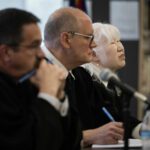At SCOTUS, Colorado’s Justice Carlos Samour looms in Trump ballot disqualification arguments

During Thursday’s oral arguments before the nation’s highest court about Donald Trump’s constitutional eligibility to remain on the ballot, the justices explicitly and indirectly channeled the member of Colorado’s Supreme Court who wrote the most impassioned critique of the legal effort to disqualify Trump.
Justice Carlos A. Samour Jr., in his dissenting opinion in December, used blistering language to cast doubt upon the use of Colorado’s election laws to declare Trump constitutionally disqualified from office on the grounds that he engaged in insurrection as president.
“I have been involved in the justice system for thirty-three years now, and what took place here doesn’t resemble anything I’ve seen in a courtroom,” he wrote. “In my view, what transpired in this litigation fell woefully short of what due process demands.”
At the U.S. Supreme Court, Justice Brett M. Kavanaugh quoted Samour’s words to the attorney arguing for Trump’s disqualification, calling Samour’s critique of Colorado’s process “powerful.”
“I don’t know whether I agree or not. I’m not gonna take a position on that,” Kavanaugh said. “But the fact that someone’s complaining not about the bottom-line conclusion, but about the very processes that were used … seems to underscore concerns that have been raised about state power.”
Kavanaugh added: “That was powerful language.”
“That language, with respect to Justice Samour, was just not correct,” replied attorney Jason Murray.
Colorado justices grapple with unprecedented possibility of disqualifying Trump from ballot
The case of Trump’s eligibility for the ballot — which rocketed to the U.S. Supreme Court a mere five months after its filing in Denver District Court — involves four Republican and two unaffiliated voters who petitioned a judge to order Secretary of State Jena Griswold to keep Trump off Colorado’s 2024 presidential primary ballot.
Although the petitioners used state elections law as their vehicle, their fundamental complaint was that Trump’s actions to halt the certification of President Joe Biden’s victory and encourage a mob of his supporters to attack the U.S. Capitol amounted to disqualifying conduct.
Specifically, Section 3 of the 14th Amendment, which was ratified in the wake of the Civil War, disqualifies senators, U.S. representatives and “an officer of the United States,” among others, from holding future office if they took an oath to support the Constitution and subsequently “engaged in insurrection.”
The Colorado Supreme Court, by 4-3, agreed with that argument and declared Trump constitutionally ineligible late last year.
Although Chief Justice Brian D. Boatright and Justice Maria E. Berkenkotter also wrote dissenting opinions raising concerns about the use of Colorado’s election code to resolve weighty constitutional questions, Samour’s opinion contained the most detailed analysis of multiple issues the U.S. Supreme Court would ultimately latch onto.
“I am disturbed about the potential chaos wrought by an imprudent, unconstitutional, and standardless system in which each state gets to adjudicate Section Three disqualification cases on an ad hoc basis,” Samour wrote.
“I’m just trying to grapple with what some people have seen as the consequences of the argument you’re advancing, which is there will be conflicts in decisions among the states. Different states will disqualify different candidates,” echoed Justice Samuel A. Alito Jr.
Trump disqualified from 2024 ballot, Colorado Supreme Court rules
“Significantly, there is a federal statute that specifically criminalizes insurrection and requires that anyone convicted of engaging in such conduct be fined or imprisoned and be disqualified from holding public office,” argued Samour.
“If the concern you have,” Kavanaugh similarly told the petitioners’ attorney, “is that insurrectionists should not be allowed to hold federal office, there is a tool to ensure that doesn’t happen — namely, prosecution of insurrectionists.”
Samour immigrated to the U.S. as a child from El Salvador, where his father was a lawyer and a judge. A 2018 Supreme Court appointee of former Gov. John Hickenlooper, Samour was previously a longtime trial judge and prosecutor in Arapahoe County. His opinions often contain aphorisms, puns and pop culture references (Samour quoted from “The Princess Bride” in his analysis of Trump’s eligibility), and his dissents can be biting.
The amicus briefs submitted to the U.S. Supreme Court frequently quoted Samour’s dissent either favorably or critically. In addition to his concerns about the process in Trump’s case, Samour offered a vigorous defense of the primary piece of precedent Trump’s lawyers relied upon: an 1869 appellate decision nicknamed “Griffin’s case,” which endorsed the idea that Congress must act to enable the disqualification of insurrectionists through Section 3.
“The Court should follow the rationale of Griffin’s Case and Justice Samour’s dissent,” Trump’s lawyers urged the Supreme Court in their brief.
History, democracy and violence: Groups weigh in to SCOTUS ahead of Trump disqualification arguments
Although Samour’s most explicit critique of Trump’s disqualification was reserved for the allegedly deficient process in the trial court — Samour deemed it a “procedural Frankenstein” — Trump did not contend there was a violation of his due process rights on appeal.
Nonetheless, Kavanaugh connected Samour’s procedural concerns with Trump’s overarching argument: that Colorado could not remove him from the ballot on its own terms.
“There was ample process here,” responded Murray, representing the petitioners. “And this is how ballot access determinations in election cases are decided all the time.”















